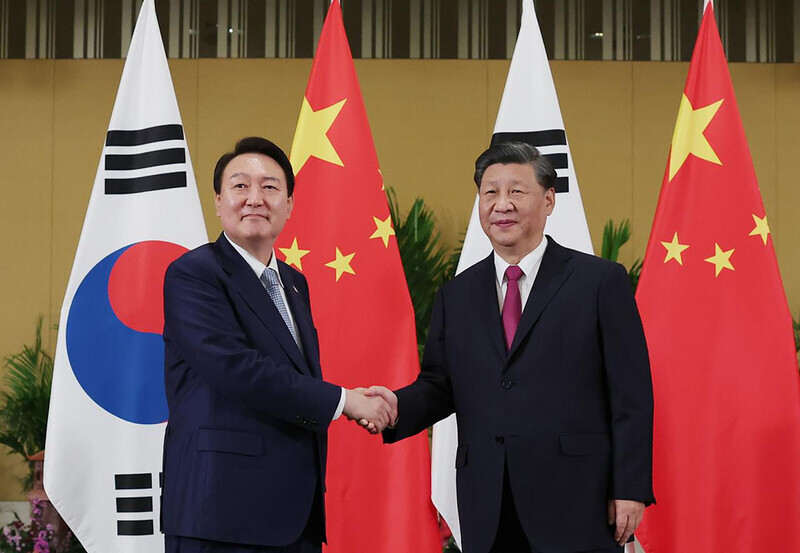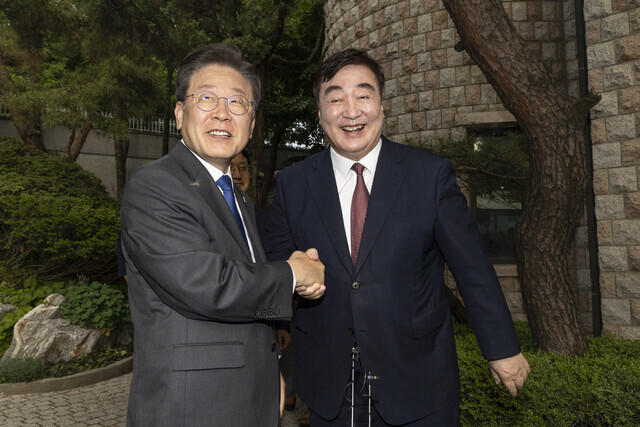hankyoreh
Links to other country sites 다른 나라 사이트 링크
In tit-for-tat envoy summons, China flashes its “wolf warrior” side at S. Korea

After China’s ambassador to South Korea blasted the Yoon Suk-yeol administration while meeting with the leader of the political opposition on Thursday, relations between Seoul and Beijing have steadily worsened, with the diplomatic authorities of both countries summoning the other’s ambassador to express displeasure.
China has been exhibiting a high-handed attitude beyond what is considered customary toward Yoon’s pro-US foreign policy line. Recently, China has dialed down its so-called wolf warrior diplomacy, a foreign policy strategy characterized by its aggressiveness, but it is maintaining an uncompromising attitude toward South Korea in particular.
Experts analyzed that China seems to be taking an offensive strategy toward South Korea, which, unlike other countries seeking improved relations with China, has engaged in a tit-for-tat strategy.
On Sunday, China’s Ministry of Foreign Affairs announced that its Assistant Minister of Foreign Affairs Nong Rong met with South Korean Ambassador to China Chung Jae-ho, where Nong expressed “serious concern and dissatisfaction over South Korea\'s inappropriate response to the meeting and exchanges between the Chinese Ambassador to South Korea Xing Haiming and South Korea\'s main opposition Democratic Party leader Lee Jae-myung.”
The ministry further revealed that Nong explained China’s position regarding South Korea-China relations to Chung, arguing that it is Xing’s “responsibility” to have contacts and exchanges with various South Korean figures as well as his “purpose to enhance understanding, promote cooperation, and protect and push forward the advancement of China-South Korea relations.”
The ministry added, “We hope South Korea reflects on where current problems in China-South Korea relations lie and take them seriously, earnestly abiding by the spirit of the joint statement on the establishment of diplomatic relations between China and South Korea and proactively making efforts for the sound and stable advancement of bilateral relations together with China.”
The Chinese Ministry of Foreign Affairs used the word “yuejian” to describe the meeting between Nong and Chung, which is a Chinese diplomatic term referring to the act of summoning a foreign ambassador stationed in China to deliver complaints. “Yuejian” is not as severe as “zhaojien” but corresponds with the term used by Korea when it summoned China’s ambassador in Seoul.
According to the South Korean Ministry of Foreign Affairs (MOFA), First Vice Foreign Minister Chang Ho-jin summoned Xing on Friday to “issue a stern warning and express deep regret over [his] insensible and provocative actions in defiance of diplomatic practice.”
Foreign affairs officials on both sides have been trading messages of protest in the wake of Xing’s actions on Thursday, when he told Lee during a visit to his ambassadorial residence that those “betting that the US would be victorious over China” would “certainly come to regret that.”

This is not the first time South Korean and Chinese diplomatic officials have taken the step of summoning the other side’s ambassador and making strongly worded remarks.
On April 20, Reuters published an interview with Yoon in which he was quoted as saying that tensions in the Taiwan Strait “occurred because of the attempts to change the status quo by force,” adding that “we together with the international community absolutely oppose such a change.” Both South Korea and China summoned the other side’s ambassadors in the wake of its publication.
During the same interview, Yoon said, “The Taiwan issue is not simply an issue between China and Taiwan but, like the issue of North Korea, it is a global issue.”
Recently, it has been a rare occurrence for Chinese diplomatic officials to show such a prickly response. Beijing has largely steered clear of the aggressive “wolf warrior diplomacy” it had come to be known for since President Xi Jinping began his third term last October.
As its ambassador to the US, it chose Xie Feng, a vice foreign minister who is regarded as a relative moderate. Another change from the past was on view when it switched out ministry spokesperson Zhao Lijian, who was famous for his coarsely worded denunciations of other countries’ “anti-China remarks.”
“China appears to have altered its course after failing to achieve much success with the ‘wolf warrior diplomacy’ approach it showed in the past,” said Lee Sang-man, a professor at the Kyungnam University Institute for Far Eastern Studies.
But the hard-line approach that Beijing has recently adopted with Seoul has evoked associations with the “wolf warrior” style of the past.
Experts attributed this to the South Korean government adopting a foreign relations approach of applying pressure against China — including stronger trilateral cooperation with the US and Japan — and repeatedly making remarks about the Taiwan issue, which China has characterized as one of its key interests.
“China’s diplomatic style may have changed, but there has not been and will not be any change on its basic stance on matters like the Taiwan issue that relate to its key interests,” said Lee Nam-ju, a professor of Chinese studies at Sungkonghoe University.
“As the South Korean government has continued to make remarks that touch on a key interest of China’s, China has continued sending the message of ‘right now, it’s just rhetoric, but we intend to respond more forcefully in the future,’” he explained.
Even countries that had been at odds with China in the past have been moving to improve their relationship with it.
Numerous foreign news outlets have reported that US Secretary of State Antony Blinken plans to visit China this week to meet with senior officials including President Xi Jinping and Foreign Minister Qin Gang.
Australia’s Trade Minister Don Farrell also visited Beijing on May 11 to meet with his Chinese counterpart, Minister of Commerce Wang Wentao, and reach an agreement on expanded trade cooperation. The first such meeting by an Australian trade minister in four years, it came after a period of friction between Canberra and Beijing.
Experts predicted the pressure from China will continue to intensify.
“South Korea is the only country in the whole world that is standing on the front lines of deterrence and pressure against China and ramping up its intensity,” said Kim Heung-kyu, the director of the Ajou University US-China Policy Institute.
“China has been sending various friendly signals to South Korea with things like Xi Jinping’s visit to an LG Display factory in Guangzhou, but now it appears to have given up on those efforts and shifted to a strategy of deterrence and pressure against South Korea,” he explained.
By Shin Hyeong-cheol, staff reporter; Kim Mi-hyang, staff reporter
Please direct questions or comments to [english@hani.co.kr]

Editorial・opinion
![[Column] When ‘fairness’ means hate and violence [Column] When ‘fairness’ means hate and violence](https://flexible.img.hani.co.kr/flexible/normal/500/300/imgdb/original/2024/0516/7417158465908824.jpg) [Column] When ‘fairness’ means hate and violence
[Column] When ‘fairness’ means hate and violence![[Editorial] Yoon must stop abusing authority to shield himself from investigation [Editorial] Yoon must stop abusing authority to shield himself from investigation](https://flexible.img.hani.co.kr/flexible/normal/500/300/imgdb/original/2024/0516/4417158464854198.jpg) [Editorial] Yoon must stop abusing authority to shield himself from investigation
[Editorial] Yoon must stop abusing authority to shield himself from investigation- [Column] US troop withdrawal from Korea could be the Acheson Line all over
- [Column] How to win back readers who’ve turned to YouTube for news
- [Column] Welcome to the president’s pity party
- [Editorial] Korea must respond firmly to Japan’s attempt to usurp Line
- [Editorial] Transfers of prosecutors investigating Korea’s first lady send chilling message
- [Column] Will Seoul’s ties with Moscow really recover on their own?
- [Column] Samsung’s ‘lost decade’ and Lee Jae-yong’s mismatched chopsticks
- [Correspondent’s column] The real reason the US is worried about Chinese ‘overcapacity’
Most viewed articles
- 1China calls US tariffs ‘madness,’ warns of full-on trade conflict
- 2[Column] US troop withdrawal from Korea could be the Acheson Line all over
- 3[Editorial] Yoon must stop abusing authority to shield himself from investigation
- 4[Column] When ‘fairness’ means hate and violence
- 5[Column] How to win back readers who’ve turned to YouTube for news
- 6US has always pulled troops from Korea unilaterally — is Yoon prepared for it to happen again?
- 7[Book review] Who said Asians can’t make some good trouble?
- 8Naver’s union calls for action from government over possible Japanese buyout of Line
- 9Could Korea’s Naver lose control of Line to Japan?
- 10[Editorial] Korea must respond firmly to Japan’s attempt to usurp Line